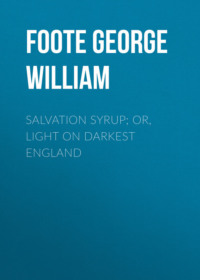 полная версия
полная версияFlowers of Freethought (First Series)
Suppose a man had the power of creating another thinking and feeling being. Suppose he could endow him with any qualities he chose. Suppose he created him sickly, foolish, and vicious. Would he not be responsible for the curse of that being's existence?
Man is what he is because he is. He is practically without choice. The cards are dealt out to him, and he must take them as they come. Is it just to damn him for holding a bad hand? Is it honest to give him hell for not winning the game?
Let us use for a moment the cant language of theology. Let us imagine the vilest of "damned sinners" in Gehenna. Does not every scientist, and every philosopher, know that the orb of his fate was predetermined? Would not that "lost soul" have the right to curse his maker? Might he not justly exclaim "I am holier than thou"?
Do not imagine, reader, that this new reading of the book of fate has no practical significance. When we get rid of the idea of "damned sinners," when we abolish the idea of "sin" altogether and its correlative "punishment," and learn to regard man as a complicated effect in a universe of causation, we shall bring wisdom and humanity into our treatment of the "criminal classes," we shall look upon them as moral lunatics and deal with them accordingly. And this spirit will extend itself to all human relations. It will make us less impatient and angry with each other. We shall see that "to know all is to pardon all." Thus will the overthrow of theology be the preparation for a new moral development. Another link of the old serpent of superstition will be uncoiled from the life of humanity, leaving it freer to learn the splendid truth, taught by that divine man Socrates, that wisdom and virtue are one and indivisible.
WHERE IS HELL?
This is a question of great importance, or at least of very great interest. According to the Christian scheme of salvation, the vast majority of us will have to spend eternity in "sulphurous and tormenting flames," and we are naturally curious as to the situation of a place in which we shall experience such delightful sensations.
But there is hardly any subject on which we can obtain so little information. The clergy are becoming more and more reticent about it. What little they ever knew is being secreted in the depths of their inner consciousness. When they are pressed for particulars they look injured. Sometimes they piteously exclaim "Don't." At other times they wax wroth, and exclaim to the questioners about the situation of hell, "Wait till you get there."
Just as heaven used to be spoken of as "up above," hell was referred to as "down below." At one time, indeed, it was believed to be underground. Many dark caves were thought to lead to it, and some of them were called "Hell Mouth." Volcanoes were regarded as entrances to the fiery regions, and when there was an eruption it was thought that hell was boiling over. Classic mythology, before the time of Christ, had its entrances to hell at Acherusia, in Bithynia; at Avernus, in Campania, where Ulysses began his journey to the grisly abodes; the Sibyl's cave at Cumæ, in Argolis; at Tænarus, in the southern Peloponnesus, where Hercules descended, and dragged Cerberus up to the daylight; and the cave of Trophonius, in Lebadea, not to mention a dozen less noted places.
The Bible always speaks of hell as "down," and the Apostles' Creed tells us that Christ "descended" into hell. Exercising his imagination on this basis, the learned Faber discovered that after the Second Advent the saints would dwell on the crust of the earth, a thousand miles thick, and the damned in a sea of liquid fire inside. Thus the saints would tread over the heads of sinners, and flowers would bloom over the lake of damnation.
Sir John Maundeville, a most engaging old liar, says he found a descent into hell "in a perilous vale" in Abyssinia. According to the Celtic legend of "St. Brandon's Voyage," hell was not "down below," but in the moon, where the saint found Judas Iscariot suffering incredible tortures, but let off every Sunday to enjoy himself and prepare for a fresh week's agony. That master of bathos, Martin Tupper, finds this idea very suitable. He apostrophises the moon as "the wakeful eye of hell." Bailey, the author of Festus, is somewhat vaguer. Hell, he says, is in a world which rolls thief-like round the universe, imperceptible to human eyes:
A blind world, yet unlit by God,Boiling around the extremest edge of light,Where all things are disaster and decay.Imaginations, of course, will differ. While Martin Tupper and other gentlemen look for hell in the direction of the moon, the Platonists, according to Macrobus, reckoned as the infernal regions the whole space between the moon and the earth. Whiston thought the comet which appeared in his day was hell. An English clergyman, referred to by Alger, maintained that hell was in the sun, whose spots were gatherings of the damned.
The reader may take his choice, and it is a liberal one. He may regard hell as under the earth, or in the moon, or in the sun, or in a comet, or in some concealed body careering through infinite space. And if the choice does not satisfy him, he is perfectly free to set up a theory of his own.
Father Pinamonti is the author of a little book called Hell Open to Christians, which is stamped with the authority of the Catholic Church, and issued for the special edification of children. This book declares that hell is four thousand miles distant, but it does not indicate the direction. Anyhow, the distance is so small that the priests might easily set up communication with the place. But perhaps it only exists in the geography or astronomy of faith.
Father Pinamonti seems particularly well informed on this subject. He says the walls of hell are "more than four thousand miles thick." That is a great thickness. But is it quite as thick as the heads of the fools who believe it?
Our belief is that hell is far nearer than the clergy teach. Omar Khayyam, the grand old Persian poet, the "large infidel," as Tennyson calls him, wrote as follows – in the splendid rendering of Edward Fitzgerald: —
I sent my soul through the invisible, Some letter of that after-life to spell, And by and bye my soul returned to me, And answered, I myself am heaven and hell.
Hell, like heaven, is within us, and about us in the hearts of our fellow-men. Yes, hell is on earth. Man's ignorance, superstition, stupidity, and selfishness, make a hell for him in this life. Let us cease, then, to dread the fabled hell of the priests, and set ourselves to the task of abolishing the real hell of hunger, vice, and misery.
The very Churches are getting ashamed of their theological hell. They are becoming more and more secularised. They call on the disciples of Christ to remedy the evils of this life, and respond to the cry of the poor for a better share of the happiness of this world. Their methods are generally childish, for they overlook the causes of social evil, but it is gratifying to see them drifting from the old moorings, and little by little abandoning the old dogmas. Some of the clergy, like Archdeacon Farrar, go to the length of saying that "hell is not a place." Precisely so, and that is the teaching of Secularism.
SPURGEON AND HELL
Charles Lamb was one of the best men that ever lived. He had his failings, but he never harmed anyone but himself. He was capable of astonishing generosity, and those acquainted with the inner tragedy of his life know that it was a long act of self-denial. He was also extremely modest but not utterly devoid of indignation; and if he could not denounce bitterly, he could speed a shaft of satire into the breast of wickedness or cruelty. On one occasion, in the days of his youth, he was justly annoyed by his friend Coleridge, whose character was very inferior to his own, though he always assumed a tone of moral superiority. Lamb was so galled by Coleridge's air of virtue and piety, at a moment when the humorist was suffering terribly in consequence of his sister's calamity, that he sent the transcendental poet a list of stinging questions. One of them asked whether one of the seraphim could fall, and another whether a man might not be damned without knowing it.
This last question suggests itself in the case of Mr. Spurgeon. Mrs. Spurgeon, Dr. Pierson, and other of the great preacher's friends, are all assuring us that he is in glory. Writing seven days after his death, Mrs. Spurgeon said "he has now been a week in heaven." It is natural that she should think so, and we do not wish to rob her of any consolation, nor do we suppose that this article will ever come under her notice. But is it not just possible that Spurgeon has gone to hell? And why should not the question be raised? We mean no personal offence; we speak in the interest of justice and truth. Spurgeon was very glib in preaching about hell, and we do not know that he had a monopoly of that special line of business. He never blenched at the idea of millions of human beings writhing in everlasting torment; and why should it be blasphemy, or even incivility, to wonder if he himself has gone to perdition?
Predestination, as the Church of England article says, is wonderfully comforting to the elect; that is, to those who imagine themselves to be so. But what if they are mistaken? What if a man, yea a fancied saint, may be damned without knowing it? God Almighty has not published lists of the Sect. Many a Calvinistic Pharisee is perhaps a self-elected saint after all, and at the finish of his journey may find that he has been walking in the wrong direction.
One of Spurgeon's rooted notions was that unbelievers were sure of hell. They bore the mark of predestinate damnation broad upon their fore-heads. Now at the bottom this means that a man may be damned for believing wrongly. But how can anyone be sure that Spurgeon was absolutely right? The Baptists are only one division of Christians. There are scores of other divisions. All cannot be right, and all may be wrong. Even if one is entirely right, how do we know it is the Baptists? According to the law of probabilities, Spurgeon was very likely in the wrong; and if wrong belief, however sincere, entails damnation, it is quite possible that at 11.5 p.m. on Sunday, January 31, Spurgeon entered Hell instead of Heaven.1
Far be it from us to wish a fellow creature in Hell, but there is always a certain pleasure in seeing the engineer hoist with his own petard. All tragedy has a touch of comedy. Fancy Spurgeon in Hades groaning "I sent other people here by the million, and here I am myself."
How would this be worse than the groan of any other lost soul? Few men are devils or angels. Most are neither black nor white, but grey. Between the best and vilest how much difference is there in the eye of infinite wisdom? And if God, the all-knowing and all-powerful, created men as they are, strong and weak, wise and foolish, good, bad, and indifferent; there is no more injustice in Spurgeon's burning in Hell than in the damnation of the worst wretch that ever cursed the world.
Spurgeon used to preach hell with a certain gusto. Here is a hot and strong passage from his sermon on the Resurrection of the Dead:
"When thou diest', thy soul will be tormented alone; that will be a hell for it; but at the day of judgment thy body will join thy soul, and then thou wilt have twin-hells, thy soul sweating drops of blood, and thy body suffused with agony. In fire exactly like that which we have on earth thy body will lie, asbestos-like, for ever unconsumed, all thy veins roads for the feet of pain to travel on, every nerve a string on which the Devil shall for ever play his diabolical tune of Hell's Unutterable Lament."
After preaching this awful doctrine a man should be ill for a fortnight. Would it not afflict a kind-hearted man unspeakably to think that millions of his fellow beings, or hundreds, or even one, would suffer such a terrible fate? Would it not impair his sleep, and fill his dreams with terror? But it did not have this effect on Spurgeon. After preaching hell in that way, and rolling damnation over his tongue as a dainty morsel, he went home, dined with a good appetite, drank his wine, and smoked his cigar.
There was not the slightest doubt in Spurgeon's mind as to the endless doom of the damned. Here is an extract from another sermon —
"Thou wilt look up there on the throne of God and it shall be written, 'For ever!' When the damned jingle the burning irons of their torment they shall say, 'For ever!' When they howl, echo cries, 'For ever!'
'For ever' is written on their racks,'For ever' on their chains;'For ever' burneth in the fire,'For ever' ever reigns."How bodies are to burn without consuming, how a fire could last for ever, or how a good God could roast his own children in it, are questions that Spurgeon did not stop to answer. He took the damnable doctrine of damnation as he found it. He knew it was relished by myriads of callous, foolish people; and it gave such a pungent flavor to a long sermon! His listeners were not terrified. Oh dear no! Smith, the Newington greengrocer, was not alarmed; he twirled his thumbs, and said to himself, "Spurgeon's in fine form this morning!"
Archdeacon Farrar protests against the notion of a fiery, everlasting hell as the result of fear, superstition, ignorance, hate, and slavish letter-worship. He declares that he would resign all hope of immortality to save a single human soul from the hell of Mr. Spurgeon. But is not the hell of Mr. Spurgeon the hell of the New Testament? Does not Jesus speak of everlasting fire? Why seek to limit the duration of hell by some hocus-pocus of interpretation? It is idle to pretend that "everlasting" means something less than everlasting. If it means that in relation to hell it must also mean it in relation to heaven. Dr. Farrar cannot have two different meanings for the same word in the same verse; and should he ever go to hell (he will pardon us the supposition), how much consolation would he derive from knowing that his doom was not "everlasting" but only "eternal"? There was more honesty and straightforwardness in Mr. Spurgeon. He preached what the Bible taught him. He set forth a hateful creed in its true colors. His presentation of Christianity will continue to satisfy those who belong to the past, but it will drive many others out of the fold of faith into the broad pastures of Freethought.
IS SPURGEON IN HEAVEN?
When Mrs. Booth died, the wife of the famous "General," the "Army" reported her as "Promoted to Glory from Clacton-on-Sea." It was extremely funny. Clacton-on-Sea is such a prosaic anti-climax after Glory. One was reminded of Sir Horace Glendower:
Sprat. But the sense of humor is not acute in religious circles.
Mr. Spurgeon frequently gave expression to his dislike and mistrust of the antics or the Salvation Army. He was far from prim himself, but he held that if people were not "won over to Christ" by preaching, it was idle to bait the hook with mere sensationalism. Yet by a strange irony his closest friends, in announcing his death to his flock, actually improved on the extravagance of the Salvationists. Here is a copy of the telegram that was affixed to the rails of the Metropolitan Tabernacle the morning after his decease:
Mentone, 11.50.
Spurgeon's Tabernacle, London.
Our beloved pastor entered heaven 11.5 Sunday night.
Harrald.
This Harrald was Mr. Spurgeon's private secretary, but he writes like the private secretary of God Almighty. A leading statesman once said he wished he was as cocksure of anything as Tom Macaulay was cocksure of everything; but what was Macaulay's cocksureness to the cocksureness of Harrald? The gentleman could not have spoken with more assurance if he had been Saint Peter himself, and had opened the gate for Pastor Spurgeon.
We take it that Spurgeon expired at 11.5 on Sunday night. That is the fact. All the rest is conjecture.
How could his soul enter heaven at the very same moment? Is heaven in the atmosphere? He who asserts it is a very bold speculator. Is it out in the ether? If so, where? And how is it our telescopes cannot detect it? If heaven is a place, as it must be if it exists at all, it cannot very well be within the astronomical universe. Now the farthest stars are inconceivably remote. Our sun is more than 90,000,000 miles distant, and Sirius is more than 200,000 times farther off than the sun. There are stars so distant that their light takes more than a thousand years to reach us, and light travels at the rate of nearly two hundred thousands miles per second!
It is difficult to imagine Spurgeon's soul travelling faster than that; and if heaven is somewhere out in the vast void, beyond the sweep of telescopes or the register of the camera, Spurgeon's soul has so far not "entered heaven" that its journey thither is only just begun. In another thousand years, perhaps, it will be nearing the pearly gates. Perhaps, we say; for heaven may be a million times further off, and Spurgeon's soul may pull the bell and rouse Saint Peter long after the earth is a frozen ball, and not only the human race but all life has disappeared from its surface. Nay, by the time he arrives, the earth may have gone to pot, and the whole solar system may have vanished from the map of the universe.
What a terrible journey! Is it worth travelling so far to enter the Bible heaven, and sing hymns with the menagerie of the Apocalypse? Besides, a poor soul might lose its way, and dash about the billion-billion-miled universe like a lunatic meteor.
It appears to us, also, that Mr. Harrald and the rest of Mr. Spurgeon's friends have forgotten his own teaching. He thoroughly believed in the bodily resurrection of the dead, and an ultimate day of judgment, when bodv and soul would join together, and share a common fate for eternity. How is this reconcileable with the notion that Spurgeon's soul "entered heaven at 11.5" on Sunday evening, the thirty-first of January, 1892? Is it credible that the good man went to the New Jerusalem, will stay there in perfect felicity until the day of judgment, and will then have to return to this world, rejoin his old bodv, and stand his trial at the great assize, with the possibility of having to shift his quarters afterwards? Would not this be extremely unjust, nay dreadfully cruel? And even if Spurgeon, as one of the "elect," only left heaven for form's sake at the day of judgment, to go through the farce of a predetermined trial, would it not be a gratuitous worry to snatch him away from unspeakable bliss to witness the trial of the human species, and the damnation of at least nine-tenths of all that ever breathed?
As a matter of fact, the Christian Church has never been able to make up its mind about the state or position of the soul immediately after death. Only a few weeks ago we saw that Sir G. G. Stokes, unconsciously following in the wake of divines like Archbishop Whately, holds the view that the soul on leaving the body will lie in absolute unconsciousness until the day when it has to wake up and stand in the dock. The controversies on this subject are infinite, and all sorts of ideas have been maintained, but nothing has been authoritatively decided. Mr. Spurgeon's friends have simply cut the Gordian knot; that is, they are only dogmatising.
Laying all such subtle disputes aside, we should like Mr. Harrald to tell us how he knows that Spurgeon has gone, is going, or ever will go to heaven. What certainty can they have in the matter? Saint Paul himself alluded to the possibility of his being "a castaway." How can an inferior apostle be sure of the kingdom of heaven?
Saint Paul taught predestination, and so did Spurgeon. According to this doctrine, God knew beforehand the exact number of human beings that would live on this planet, though Omniscience itself must have been taxed to decide where the anthropoid exactly shaded off into the man. He also knew the exact number of the elect who would go to heaven, and the exact number of the reprobate who would go to hell. The tally was decided before the spirit of God brooded over the realm of Chaos and old Night. Every child born into the world bears the stamp of his destiny. But the stamp is secret. No one can detect it. Lists of saved and damned are not published. If they were, it would save us a lot of anxiety. Some would say, "I'm all right." Others would say, "I'm in for it; I'll keep cool while I can." But we must all die before we ascertain our fate. We may feel confident of being in the right list, with the rest of the sheep; but confidence is not proof, and impressions are not facts. When we take the great leap we shall know. Until then no man has any certitude; not even the most pious Christian that ever rolled his eyes in prayer to his Maker, or whined out the confession of his contemptible sins. All are in the same perplexity, and Spurgeon was no exception to the rule.
When predestination was really believed, the friends of the greatest saint only hoped he had gone to heaven. When they are sure of it predestination is dead. Nay, hell itself is extinguished. Spurgeon's friends think he has gone to heaven because they feel he was too good to go to hell. They knew him personally, and it is hard to think that a man whose hand once lay in yours is howling in everlasting fire. Such exceptions prove a new rule. They show that the human heart has outgrown the horrible doctrine of future torment, that the human mind has outgrown foolish creeds, that man is better than his God.
GOD IN JAPAN
Japan has just been visited by a terrible earthquake. Without a moment's warning it swept along, wrecking towns, killing people, and altering the very shape of mountains. A vast tidal wave also rushed against the coast and deluged whole tracts of low-lying country. It is estimated that 50,000 houses have been destroyed, and at least 5,000 men, women, and children. The first reports gave a total of 25,000 slain, but this is said to be an exaggeration. Nevertheless, as a hundred miles or so of railway is torn to pieces, and it is difficult to convey relief to the suffering survivors, the butcher's bill of this catastrophe may be doubled before the finish.
If earthquakes are the work of blind, unconscious Nature, it is idle to spend our breath in discussion or recrimination. Even regret is foolish. We have to take the world as we find it, with all its disadvantages, and make the best of a not too brilliant bargain. Instead of screaming we must study; instead of wailing we must reflect; and eventually, as we gain a deeper knowledge of the secrets of Nature, and a greater mastery over her forces, we shall be better able to foresee the approach of evil and to take precautionary measures against it.
But the standard teaching of England, to say nothing of less civilised nations, is not Naturalism but Theism. We are told that there is a God over all, and that he doeth all things well. On the practical side this deity is called Providence. It is Providence that sends fine weather, and Providence that sends bad weather; Providence that sends floods, and Providence that sends drought; Providence that favors us with a fine harvest, and Providence that blights the crops, reducing millions of people, as in Russia at this moment, to the most desperate shifts of self-preservation. It is Providence that saves Smith's precious life in a railway accident, and of course it is. Providence that smashes poor Jones, Brown and Robinson.
Now it will be observed that the favorable or adverse policy of Providence is quite irrespective of human conduct, There is no moral discrimination. If Grace Darling and Jack the Ripper were travelling by the same train, and it met with an accident, everybody knows that their chances of death are precisely equal. If there were any difference it would be in favor of Jack, who seems very careful of his own safety, and would probably take a seat in the least dangerous part of the train.
Some people, of course, and especially parsons, will contend that Providence does discriminate. They have already been heard to hint that the Russian famine is on account of the persecution of the Jews. But this act of brutality is the crime of the Government, and the famine falls upon multitudes of peasants who never saw a Jew in their lives. They have to suffer the pangs of hunger, but the Czar will not go without a single meal or a single bottle of champagne.









